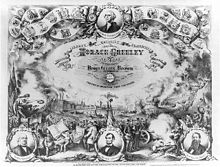
Back الحزب الجمهوري الليبرالي (الولايات المتحدة) Arabic Partido Republicano Liberal (Estados Unidos) Spanish Yhdysvaltain liberaalirepublikaaninen puolue Finnish Parti républicain libéral (États-Unis) French Liberalni Republikanie Polish Liberalrepublikanska partiet Swedish لبرل ریپبلکن پارٹی (ریاستہائے متحدہ) Urdu
Liberal Republican Party | |
|---|---|
 Liberal Republican campaign poster | |
| Historical leaders | |
| Founded | 1870 |
| Dissolved | 1872 |
| Split from | Republican Party
|
| Merged into | Republican Party
|
| Succeeded by |
|
| Ideology | |
| National affiliation | Democratic Party (1872) |
| This article is part of a series on |
| Liberalism in the United States |
|---|
 |
The Liberal Republican Party was an American political party that was organized in May 1872 to oppose the reelection of President Ulysses S. Grant and his Radical Republican supporters in the presidential election of 1872. The party emerged in Missouri under the leadership of Senator Carl Schurz and soon attracted other opponents of Grant; Liberal Republicans decried the scandals of the Grant administration and sought civil service reform. The party opposed Grant's Reconstruction policies, particularly the Enforcement Acts that destroyed the Ku Klux Klan. It lost in a landslide, and disappeared from the national stage after the 1872 election.
The Republican Party had emerged as the dominant party in the aftermath of the Civil War, but many original Republicans became dissatisfied with the leadership of President Grant. Prominent liberal leaders like Schurz, Charles Sumner and Lyman Trumbull had been leaders in the fight against slavery and for the first stages of Reconstruction. They considered the task accomplished, and thought continued radical policies to be oppressive. By 1872, they demanded an end to Reconstruction and a restoration of self-government to the South.
The 1872 Liberal Republican convention nominated a ticket consisting of Horace Greeley, longtime publisher of the New-York Tribune, and Missouri Governor Benjamin Gratz Brown. Seeking to defeat Grant, the Democratic Party nominated the Liberal Republican ticket and endorsed the Liberal Republican platform. However, Grant emerged triumphant in the election, capitalizing on superior party organization. Democrats lacked enthusiasm for Greeley, who for decades had denounced them. Greeley received 44% of the popular vote, winning the states of Texas, Missouri, Kentucky, Tennessee, Georgia and Maryland. Grant received 286 of the 352 electoral college votes. Greeley died shortly after the election.
The Liberal Republican Party vanished immediately after the election, though a handful of its leaders continued to serve in Congress. Former party members scattered into the Democratic and Republican parties. By cutting the allegiance of liberal elements to the Republican Party, the Liberal Republicans made it possible for many of these leaders to move to the Democratic Party.[citation needed]